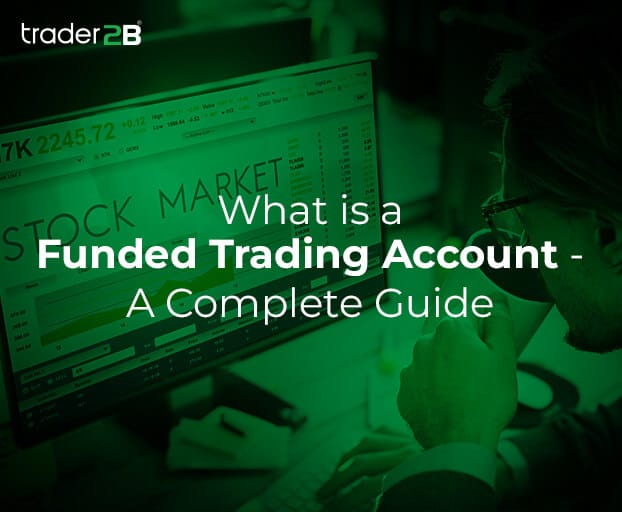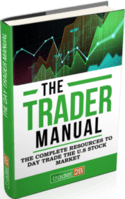Many traders possess the skills, the strategy, and the motivation, but it is their capital holding them back. That’s why a funded trading account for traders is priceless. But what is a funded trading account? Rather than putting your own capital at risk, proprietary trading companies or prop trading firms, offer you the capital you require for a share of the profits.
This model has exploded, with companies having thousands of traders register for evaluations each month. With enormous drawdowns, minimal commissions, and flexible trading terms, funded trading accounts are transforming the experience for seasoned traders.
Between December 2015 & April 2024, the prop trading industry expanded by 1264%, and the number must definitely have increased. Let’s dive deep into what funded trading accounts are and how you can get one.
What is a Funded Trading Account?
Since the 1980s, when the markets were becoming deregulated, central banks & other large institutions expanded their trading activities. Standalone prop trading firms grew from bigger banks and institutions. Fast forward to the 1990s, technology advancements led to the start of electronic trading. Since then, individual traders gained access to funded accounts, and it has continued to grow to date. trader2B also initiated its operations in 2010, when the prop trading firms were just beginning to establish in the financial markets.
A funded trading account is a capital-provision model where traders can use a prop firm’s capital to trade financial markets. This helps them sidestep the risks of personal capital and gives them a huge upper hand over regular trading.
But what’s the catch? Before providing fully funded accounts, firms evaluate the traders to make sure that they’re consistent, can manage risks well & are profitable. Once the traders show what they’re worth, traders are given fully funded trading accounts.
With established risk limits, this model is widely preferred by traders with limited personal funding and valuable market knowledge. The prop firms can easily filter out the disciplined traders from the irresponsible speculators, opening a gateway to high-volume trading.
Funded Trading Account Vs Regular Trading Account
A prop trading firm provides capital but makes sure to keep a safe side by imposing strict risk controls. The buying power is mostly capped, whereas personal accounts can offer up to 500:1. Your trading styles are also regulated and many practices like news trading as well as scalping are restricted.
Unlike a regular account, where your personal funds are at stake, a funded account lets you trade without personal financial risk with set drawdown limits.
For struggling traders who want to scale their accounts, a funded model is a professional gateway to freedom. But this freedom comes with ownership. Traders can use any strategy they want with regular accounts, but then, the loss becomes their responsibility.
How to Get a Funded Trading Account?
Getting a funded trading account isn’t just about signing up, it’s a real test of ability, discipline, and risk control. This is how you can get your spot as a funded trader with a proprietary trading firm:
Step 1: Sign up with a prop firm
First, sign up with a prop firm that offers various funding programs. You must complete an online form, get your identity verified, and accept their service terms. It is important that you sign up with a firm that’s right for you. A firm that has transparent rules, fair profit sharing, and secure funding options.
Step 2: Select your funding package
Different companies have different products and capital investment plans. Some have high initial capital, and some have scaling models with tiered levels. You can check their profit-sharing plans, fees, and drawdown rates and select a package that suits your risk tolerance. Also, you should choose the right product: Forex trades 24/5, crypto 24/7, futures 14 hours a day, and stocks 6.5 hours a day for 5 days of the week. Set your availability and a reasonable monthly profit goal to match the best package to your trading requirement.
Step 3: Successfully pass the evaluation phase
The real test is now. You will be trading in a simulated environment that will challenge your strategy, risk control, and discipline. There will be strict profit targets, drawdown limits, and trading rules. Firms like trader2B utilize the ToroChallenge to filter disciplined traders and promote them to the next level.
Step 4: Get funded with real capital
After you clear the challenge, you can access the firm capital and start trading live markets. While you’re not risking personal funds, the firm has strict trading rules. Follow these rules, and you will build your account over time. A funded account is not just ‘money’, it is a chance at testing yourself in the trading arena without financial risks.
How to choose the Right Funded Trading Account?
Not all funded trading accounts would appeal to you or are right for your trading methods. Here’s what to check before finalizing a funded trading program.
1. What are the profit splits & payout structures offered?
It is vital to look for a fair profit-sharing model. Some firms graciously let you keep up to 95% of your earnings, while some of them take a huge chunk of your earnings. The withdrawals should be hassle-free and punctual as well.
2. How do the evaluation process & trading rules work?
Every prop firm has a challenge phase, some of them offering one-step funding like trader2B, while others require multiphase evaluations. You can check the profit targets, drawdown limits and trading rules before diving in.
3. What is the buying power provided, and how much can you scale?
Many great firms offer reasonable buying power (1:10 to 1:100) and great scaling opportunities. As a trader, your ability to increase capital after regular profits will be a game-changer for you.
4. What are the trading strategies allowed by the prop firm?
Many firms do not support scalping, news trading or expert advisors. This means, if your strategy relies on these, you should find a firm that supports them.
5. Is the firm reputed, and does it have transparency?
As in any business, reputation and transparency matter the most in prop trading. You should very well read trader reviews, check payout proofs & avoid firms with hidden fees. Unclear risk management policies too, are also a red flag.
The right funded account isn’t just about capital; it’s about flexibility & a real shot at trading successfully.
Benefits of a Funded Trading Account
A funded trading account is not just an alternate method of trading; it is a route to professional trading free from the hassle of money concerns. Whether you are a seasoned trader or a beginner, this model has irrefutable advantages that can dramatically improve a trader’s opportunities.
1. Trade big with access to large capital
You have access to significant trading capital. You can trade with $50,000, $100,000, or $200,000, capital amounts most retail traders can only hope for. A 10% return on a $100,000 account is like earning $10,000 without putting up your own capital. That’s the magic of trading through a funded trading account.
2. Your personal financial risk is zero
The losses are taken care of by the company. Unlike conventional trading, where all rash decisions reflect badly on a trader’s capital, a funded account allows you to trade without fear of running your capital into the ground. This model encourages strategic trading rather than emotional trading and improves your skills under actual market conditions.
3. Lucrative profit splits & scaling opportunities
Most prop firms have profit-splitting agreements where traders keep 50%-95% of their earnings. For example, a trader who brings home $20,000 in a month on a 70/30 split keeps $14,000, which is not a bad return for using someone else’s money. To have more firepower in the market, the firm increases your capital once they see your potential.
4. No credit checks or debt; work on pure skills
No worrying about bank loans or credit checks. You pay an evaluation fee, typically $100 to $500, depending on the prop firm. If you’ve got the skills, you receive the capital.
Limitations of a Funded Trading Account
A funded trading account might look like a golden ticket. It’s big capital, risk-free, and offers financial flexibility. However, skilled traders know that each opportunity has fine print. You must be aware of the restrictions that can affect your trading experience before you enroll.
1. Evaluation fees & trading rules
Evaluation fees – Each serious company charges an assessment fee, and its typically $100 to $500 to join their evaluation challenge. Some traders may think of this as a con but in reality, it’s an investment in your trading future. While some companies charge $150 – $300 per month for evaluation, trader2B’s challenge starts at $99 per month for 3 months – the lowest you might have ever seen!
Yes, there are some restrictions like maximum drawdowns, minimum trading days & risk management rules. But these restrictions help you learn discipline and adapt to real-world volatility. Think about it this way: If you can’t trade profitably with a 10% drawdown limit, how can you survive in real markets where capital preservation is important?
2. Profit-sharing constraints
Companies generally take 50% to 70% of your earnings. But let’s be real, you’re trading their capital and not yours. While some companies take a large cut, trader2B allows consistent traders to take 95% of their earnings, one of the highest in the industry.
As a trader, the more consistent you are, the more capital you can get and the more income you can make. For traders who like growth over capital risk, this model is consistently preferred, as traders don’t have to put their savings on the line.
3. Withdrawal limitations
Funded accounts typically come with profit withdrawal conditions and require you to hit a minimum before you can cash out. This might sound limiting, but this kind of structure conditions you to be clever with capital instead of withdrawing profits all the time.
This is why choosing a prop firm with regular payouts is very important. For instance, trader2B is at the top of its stock market game by offering weekly payouts, which is one of the fastest turnaround times in history and gives traders more control over their income.
4. Limited control over your funded account
Many prop firms limit your buying power, let you access fewer instruments & also prohibit high-frequency methods like news trading, automated trading & scalping. Some traders can see this as a big drawback, but it strongly helps them hone in their trading skills and improve them from a fundamental base.
Not all companies have these restrictions, you just have to choose the right fit. trader2B allows the majority of account parameters & encourages the trader to follow their strategies and consistently grow.
Is being a Funded Trader right for you?
Stepping into funded trading isn’t just about ‘trading’ per se; it’s about mastering discipline, psychology, and risk. The capital will be provided, but the skill? That’s all on you.
Knowing risk management is key
Without solid risk management, no trader lasts long. Every trader understands the importance of saving capital before chasing profits. Keeping risk at 1% per trade, setting strict stop-loss levels & adapting to volatility is necessary. Revenge trading or emotional trading are indicators of a trader’s downfall.
Trader psychology is knowing how to handle losses, not only profits
Funded trading is risk-free, but it is also a mental war. The pressure to meet profit targets can break even the best traders. There could be a 10-trade losing streak. Can you stay calm? Are you strong enough to avoid impulse decisions fueled by fear or greed? If not, the market can exploit your emotions, and this can be tough.
Discipline is the fine line between amateurs and professionals
Strict trading rules are not just restrictions, they act as a filter for true professionals. The firms need discipline because real traders gotta follow plans and not impulses. Deviating from a strategy is okay, but knowing when to deviate is the real art.
In short, having a funded account isn’t a shortcut, it’s a test of whether you have what it takes for professional trading.
Is a Funded Trading Account really worth it?
Trading is a high-stakes business where funded accounts are not just about getting capital. It’s a motivator to scale your strategy without personal risk. Whether you are an algo trader working on automated trading or a discretionary trader working on improving your profits, funded accounts are a great way to enhance your capital efficiency and become a successful trader.
You can not just ‘become’ funded but ‘stay’ a funded trader with sustainable risk management, psychological resilience, and consistent practice. Treat trading like a business with a funded account and not a gamble, and you’re well on your way to profitable opportunities.
FAQs
1. What are the best-funded trading accounts?
Some of the most well-funded trading accounts available in 2025 are:
trader2B provides a variety of adaptable funding alternatives via its Toro25, Toro100, and Toro150 initiatives, which accommodate account sizes reaching up to $150,000 and 95% profit sharing, alongside an efficient one-step assessment procedure.
TopStep: Offers $50K to $150K account size with 90%-100% percentage of profit sharing.
Earn2Trade: Offers accounts between $25K and $200K, 80% of which is taken in profit share.
trader2B stands out in that it has a low subscription rate of $99 (for 3 months) and an opportunity for its traders to scale up their capital depending on their performance.
2. Can beginners apply for a funded trading account?
Yes, new traders can get a funded trading account. The majority of proprietary trading firms, such as trader2B, offer support to traders of all levels of experience. trader2B usually offers educational materials and assistance to guide new traders to learn how to trade and create strategies.
3. How much can I earn as a funded trader?
Earnings made by traders trading on funded accounts can be highly fluctuating, depending on experience, risk management strategies, and current market conditions. Traders usually anticipate an average monthly keepback of approximately 5% of their earnings. For instance, starting to trade with a funded account of $100,000 and earning consistent profits can result in traders earning approximately $5,000 on a monthly basis. Some traders indicate average settlements of approximately $7,000, depending on their performance levels and the profit-sharing arrangements of the trading firm.
4. What if I fail the assessment process?
If you do not pass the evaluation process, you typically lose the rights of the funded trading account. You do not, however, incur financial responsibility for losses during this period. To proceed with applying for funding, you would need to reapply and undergo the evaluation process again. You need to strictly adhere to rules during the evaluation, to not lose any potential gains.
5. Is a funded trading account worth it?
The worth of a funded trading account is largely dependent on individual circumstances. Does a trader have the risk capacity, skills & patience to make it through? It also offers advantages such as the capacity to trade more money without jeopardizing personal finances and the potential for significant monetary gains. As a disadvantage, the requirement to follow strict trading rules and share profits. For the majority of traders who want to learn and experiment with full-time trading without jeopardizing personal finances, a funded trading account is 100% worth it.





